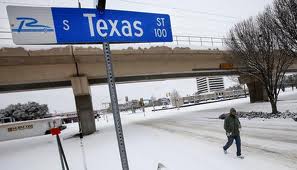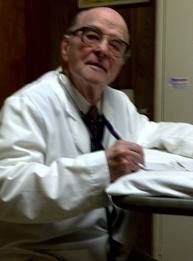February 9th, 2011
Snow Days in Texas
Greg Bratton, MD
 Believe it or not, it snowed in Texas this week. Mixed between our normal seasonal 60-degree days, were 5 days of ice, snow, and wintery chaos. To most outside of the Lone Star State, snow days aren’t that big a deal. You put on a heavier coat, grab the snow shovel, strap the chains on the tires, and trudge your way through life as if nothing happened.
Believe it or not, it snowed in Texas this week. Mixed between our normal seasonal 60-degree days, were 5 days of ice, snow, and wintery chaos. To most outside of the Lone Star State, snow days aren’t that big a deal. You put on a heavier coat, grab the snow shovel, strap the chains on the tires, and trudge your way through life as if nothing happened.But not here in Texas.
In Texas, when it snows, life stops. No one leaves their house. The roads become barren ice lands. The hardware stores sell out of their limited supply of space heaters — usually enough for the occasional power outage — and grocery stores sell canned goods as if the Apocalypse is coming and the only way to survive is to bunker down for years on end.
Case in point, for the 5 days that the Arctic decided to visit North Texas, all the clinics I had scheduled were cancelled, leaving me at home with my wife and son. Sure, I enjoyed myself – making snowmen, sledding, relaxing by the fire, and snuggling under a warm blanket — but the thought did cross my mind, “While I am here enjoying myself, where are my patients, and what is happening with them?”
Unlike a lot of professions, being a doctor dictates that even when most have time off, we don’t. We don’t have Christmas breaks or government holidays. We work. We work because we have patients, and patients don’t schedule their sicknesses or their traumas around a predetermined calendar. In fact, while in residency, I have had to work or be on call every major holiday for the last 3 years. But what are you going to do? Stop practicing medicine? Nope. So, naturally, as I remained homebound, something felt amiss.
The other day, as I relaxed in my pajamas with a hot cup of coffee and the morning paper open to the sports section, I realized that I was beginning to feel guilty. Guilty because the people that count on me most — my patients — were potentially at home struggling with their COPD, fighting a fever, or cursing the heavens because their arthritis pain was out of control. And, yet, here I was, soaking in a few extra days with my son, finally catching my breath after a hectic month on Medicine, and loving it. Truthfully, I was enjoying life.
But what else was I supposed to do? It was snowing in Texas.
 Doc Dohner, as the people of Rushville, IL, call him, has been working as a small town physician for the past 55 years. He works around the clock. In fact, in his 55 years of providing care and service to the people of Rushville, Doc has never had a day off. It is reported that, even after he broke his back and suffered a heart attack, he treated patients from his home. “I have to take care of my patients first,” he said.
Doc Dohner, as the people of Rushville, IL, call him, has been working as a small town physician for the past 55 years. He works around the clock. In fact, in his 55 years of providing care and service to the people of Rushville, Doc has never had a day off. It is reported that, even after he broke his back and suffered a heart attack, he treated patients from his home. “I have to take care of my patients first,” he said.
So how does he do it? How does he maneuver around the environment and the unpredictability of life to continue to place patients first? How does he not feel guilty about always working and being away from his family?
Lynn Stambaugh, Doc’s office manager and a former baby that he delivered, thinks that it is because “every day he makes a difference to at least one person, and if you can do that, you can go on.”
After I came across this story, my guilt shifted to shame. Here is a man that not only has sacrificed holidays, but his entire life to serve his patients. And then there was me, at home, playing with my 15-month-old son, and thinking to myself, “I wish I could stay home every day and not go back to work.” I have always said that family will come first in my life, regardless of where I am or what I am doing. This is a belief that I hold dear and vowed, not only personally, but to my wife on our wedding day. However, this fantastic physician in rural Illinois places patients first every day.
So I questioned, “Am I being selfish? Does this reflect on my capacity as a doctor? Are my priorities twisted?”
Then I realized. My priorities aren’t twisted. Doc Dohner has the same mindset that I do. But whereas my family consists of my wife and son, his family included the 4,300 people of Rushville and the 3500 babies he has delivered. He wasn’t trudging through life taking care of patients; he was taking care of his family. He cared when someone was in the emergency room or was in distress, just like I would care if my wife was in the same situation.
I had it right. I should want to be home. I spend way too many nights away, pouring my heart and soul into treating my patients “as if they were family,” — a few days for myself with my real family is just what the doctor ordered.
Plus, I am pretty sure that as I built Frosty with my son, shared a blanket beside the fire, and held him tight to keep warm, I made a difference to him. And that erases any guilt or shame that I may have temporarily experienced.
Now, does anyone know how to treat Cabin Fever?? I have a bad case of it.

